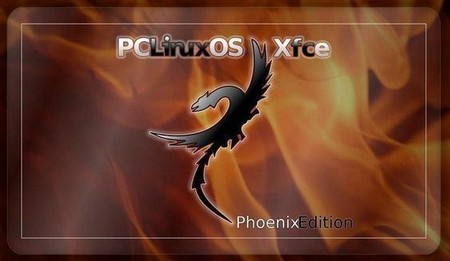Ohio Linux Fest — 40 Years of Unix
by Bob Krausen (BobK54)
The seventh annual Ohio Linux Fest was held at the Ohio Convention Center in Columbus OH on September 25th, 26th, and 27th. The theme for this year was "40 Years of Unix".
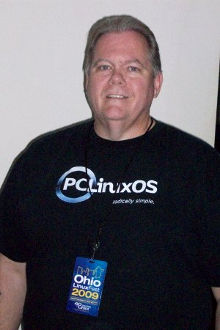
This was my second Ohio Linux Fest and I proudly wore my new PCLinuxOS t-shirt fresh from Cafepress. OVER 1,100 people attended OLF2009 despite the economy and weak pre-registration. A TOTAL success story! My camera died on me at OLF, so I've scavenged a few pictures from other sources and present them with attribution.
OLF2009 didn't disappoint. I attended only the Saturday open session. The Friday sessions had two very different main focus groups: the first was a tutorial class for professionals who wanted to take the LPI Certification exam for Linux System Administrators; the second was a Linux Basics Class sponsored by FreeGeek Columbus where participants not only learned their way around an Ubuntu desktop, they actually assembled their own computer from donated parts and got to take it home. The Linux community gained 19 converts that Friday, and 19 people gained an understanding of how a computer works and how freedom really feels. Friday always holds the pre-party which I, again, had to bypass. The Sunday session seemed interesting, but I couldn't attend. It was a workshop entitled "End Elitism: Diversity in Open Source".
Saturday morning started off with a lively opening keynote on "Saving the Economy with Linux", by Shawn Powers, an Editor for Linux Journal. Shawn's "day job" is as Technology Director at a school district in northern Michigan. He told us we need to focus not only on adult converts to Linux, but the kids as well. Teach them the value of freedom. He told us to be honest while evangelizing about Linux. Don't bash MS, sell Linux's advantages. Be upfront with issues. From his point of view, he can see some disadvantage in all the desktop environments in Linux, while some others may see that as freedom of choice. He also faults the variety of package managers out there.
The rest of Saturday had 28 classes spread over eight sessions to cover a myriad of interests, from user to hardcore developer. I learned some of the Linux boot process as presented by Dann Washko of TLLTS fame; I learned some things about the new Gnome 3.0 coming out, about Moblin 2.0, about the legalities of FOSS, about building a community, about Drupal, and about KDE4. The list of classes was amazing. I wish I could have attended more.
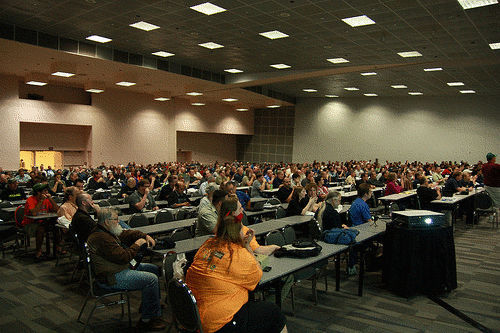
Since the theme of OLF2009 was "40 Years of Unix," two sessions were especially interesting to me. Peter Salus, author of "The Daemon, the Gnu, and the Penguin," among many other books and generally regarded as the historian of Unix, gave a great presentation. His presentation was a montage of issues and events from the year 1969. He pointed out the political, the ecological, and the technological events of the year. Most poignant of all the slides were one depicting the birth of Unix and another depicting the birth of Linus Torvalds. Those two slides brought together the message of why 1,100 of us might gather in Ohio in 2009 to celebrate something as mundane as a computer operating system.
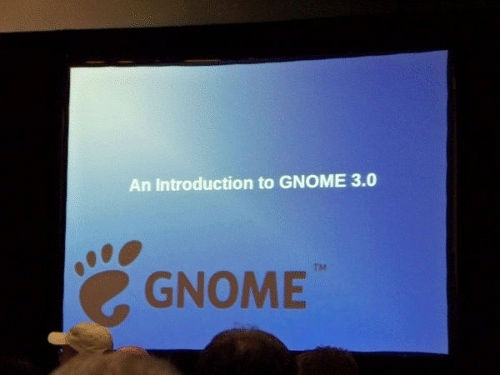
The second session of interest was the closing keynote given by Douglas McIlroy. Mr. McIlroy's presentation was called "A Surfeit of Sophistication," and was a rather scathing critique on where Unix and Linux commands are today versus at the birth of Unix. Mr. McIlroy was in charge of part of Bell Labs in 1969. One of his direct reports needed to do some kind of computer calculations and he went home and wrote the first stanzas of what we know today as Unix. Mr. McIlroy developed Unix pipes and Unix tools such as spell, diff, sort, join, graph, speak, and tr. To illustrate his loathing of the current state of Unix/Linux tools, he noted the command line entry "less," which, if you consult the man pages via "less –help" gives you 220 lines of options for that command. His comment was "Why? How can 'less' be more than 220 lines of options long?". He also noted the command "ssh" which has 38 options and 64 configurations. He admitted there was probably a reason for each of those permutations but he bets many are unused dross in the system today. His point was he was concerned the operating system he and his cohorts gave birth to 40 years ago is not as svelte today as it was envisioned at that time. I think he was saying we have gotten sloppy over time because simply because we could get sloppy. In 1969 they HAD to be svelte, since they had minimal amounts of memory to play with.
The Linux elite are, thankfully, mere "fellow attendees" at OLF. Everyone is very much available, and will take the time to talk to you. Remember, I'm NOT a developer, just a end user! Last year I stood next to and chatted with Jono Bacon of Ubuntu community fame. This year I briefly met Bdale Garbee to talk about his lost "model" rocket he described in one of last years sessions. Bdale, by the way, is the Chief Technologist for Open Source and Linux at a little company called HP. At lunch I ran into Steve Lake, author of Raidens Realm (raiden.net). Steve stopped me because of my PCLinuxOS shirt! He spoke very highly of our community and said he still highly recommends our distro to anyone wanting a painless Linux experience. The TLLTS guys were everywhere and did their usual podcast from their OLF booth. There were 37 booths to visit including IBM, Oracle, Digium (asterisk), Novell, Zenoss, TLLTS, Linux in a Ham Shack, Ubuntu LoCo, FreeGeek Columbus, EFF, FSF, Redhat, Peak 10, LinuxProMag, ZaReason, Ontario Linux Fest, Fedora, KDE, Drupal and tech hip-hop entertainment Dual Core. There was not as much schwag this year, and the economy played a roll in that I'm sure.
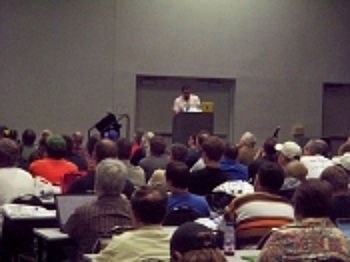
Ohio Linux Fest 2009 was a great success from my point of view and I would highly recommend attending a Linux festival near you, if you get the chance.
Photo Credits:
Main meeting area, courtesy of Brad McMahon. Gnome 3.0 presentation and seminar session, courtesy of Steve Lake, (Raiden's Realm).
